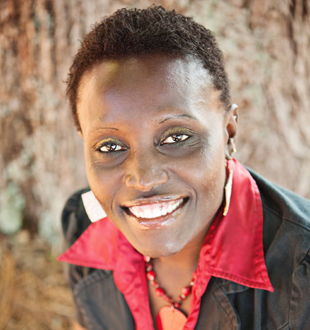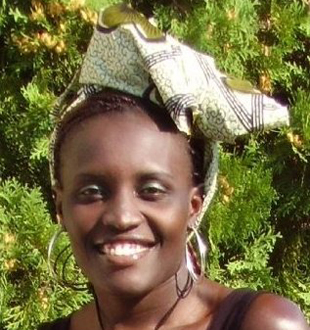| Future Students | Students | Scholars & Faculty | Alumni & Global Community | Donate |
Service to the World Begins at Home for Kenyan Alumna
AUBURN – Esther Ngumbi’s story is one that could stir the spirits of Charles Dickens or Horatio Alger.
Her life’s accomplishments have been impressive, but her relentless drive and desire to improve the lives of her people are stunning.
Growing up outside the village of Kikoneni in Kenya, she lacked convenience but considered herself wealthy in life experience.
"Growing up we had a beautiful life. We didn’t have everything that I have right now, but everything we had was all we knew about, and we were happy," Ngumbi said. "No electricity, no running water, not much of the modern life or facilities like the Internet.
"Life was pretty basic. I would wake up in the morning and go to the river, come back, go to school, come back and then go to the river again, fetch water, look for firewood, come cook for everybody and then to bed and then life just continued. But we were a very happy family."
She likely could have been satisfied with an ordinary life in rural Kenya, but her family was different from the other families of farmers in the area in one important aspect. "My parents are teachers," Ngumbi said, "so they always said they wanted a professor."
Ngumbi did not understand what a professor was since there were none in her village. She thought she would like to work at a bank, being impressed by the professional dress of the bank tellers and the climate-controlled environment of the bank which she observed once a month when her parents would travel into town to pick up their paychecks.
Her parents continually stressed education, but Ngumbi was fine with doing just enough to get by at school. She sheepishly admitted to changing the grades on her report card to please her parents until her parents got wise to her scheme.
"They sensed there was something going on. They didn’t tell me that they had decided that they were going to take me to the school. My father accompanies me to the school and says to the head teacher, ‘I want to find out how my daughter did last time.’ They caught me," Ngumbi said as she exhaled a sigh.
But this episode brought about a change in Ngumbi’s attitude about education. She soon realized she did not have to cheat but only study to excel in the classroom. By the next semester, she went from around 60 of 120 in her class rankings to number two and eventually worked her way up to the top of her high school class.
She was accepted into the local university to study science, despite not having a great interest in the subject in the beginning of her studies. But while studying zoology, she discovered insects tickled her intellectual fancy, so she aimed her academic trajectory toward the field of entomology.
She left Kenya with a bachelor’s and master’s degree, worked in Israel for two years and, after a brief stint studying in Idaho, found her way to Auburn where she completed her Ph.D. in entomology in 2011. She currently performs postdoctoral work at the university studying phorid flies, a parasitoid to the fire ant, and the possibility of using them as a biological control for the fire ant. A parasitoid is similar to a parasite except it usually kills its host rather than continually living off the host’s nourishment.
Ngumbi reached her and her parents’ ambitious goal of getting a doctorate. She should be satisfied with the fantastic journey her life has already traversed. But she is not. Her thoughts always meander back to Kenya.
"The community as a whole is poor in that the quality of life is really something, even up to today, that I think about," Ngumbi said. "Some people don’t have employment, have many children and don’t have a source of income. They’ve been farming the same place over and over, and through time, as they give back to their sons, the sons take ownership of the piece of land and then it is subdivided further.
"The quality of life, the houses, where they sleep, what they eat, is tough. It’s something that inspires me to do what I do every day, and I’m really always thinking about them and how can I make their lives better. "My heart is especially touched by the women because I think about them and how they work so hard and the quality of life they live up to today is still something I really work very hard to make sure I can turn that around. That doesn’t say that they aren’t still very happy people, no matter what."
Ngumbi has several projects going in Kenya while she works in Auburn. Her biggest goal is finally coming to fruition after years of planning and searching for resources.
"I find agriculture a very core component of development," Ngumbi said. "So in my mind I have this big dream where I would like to have hundreds of acres filled with greenhouses, and we are growing vegetables.
"Those poor women farmers are my employees, and they are working in the greenhouses, and they’re getting their pay, and they’re able to make an income, so that they are able to build good houses and improve their way of living."
This summer she finally received a check from Auburn’s Women’s Resource Center and Penn State University to cover the cost to construct the first greenhouse, which is already built and operating. "It’s just amazing. I can’t tell you how happy I am," she said.
She already has two other service projects operating in her native region. One is a school her parents started last year to spread their message of education to children outside of their family. Auburn, again, is helping with this project.
"Through the College of Engineering, we have one professor who helped us actually send a water purification system kit. We have already done that," Ngumbi said. "He has also given us a solar panel, so we’re going to ship that to Kenya. It’s going to be used for the school, so the students will be able to read after school because, as I said, we don’t have electricity.
"We’ve had students from an Auburn University class send books for the library. So we’re trying to really equip the school. Once again, the Women’s Resource Center and Women in Science and Engineering have really taken what I want to do and helped me. They put up a blog and a web page. It’s not just in me anymore; it’s in their hands."
Ngumbi and the Women’s Resource Center also started a mentoring program in 2011 to inspire the young girls in her area of Kenya to get an education and reach their potential through communication with Auburn students. She beams with pride when sharing one of the girls involved in the mentoring project recently had the top examinations score of the entire school district.
Ngumbi’s optimism and enthusiasm are infectious. After speaking with her only a few minutes, it becomes easy to see how she has sold her vision for a better life for people living around Kikoneni. With Ngumbi championing their cause, their path becomes a little smoother and straighter.
"It’s not about me because I feel I’ve already attained my dream. It’s about them and me being able to help them. That’s my entire focus in my life," Ngumbi said. "Once I achieve that, that’s it. That’s all I need."
Last Updated: September 7, 2013






